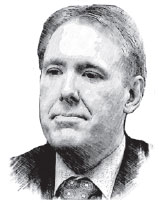

Editor's note: China Daily reporter Zhang Yunbi spoke in Beijing with five leading US scholars or former foreign policy advisers about the China-US relationship ahead of President Xi Jinping's first state visit to the United States, and they were asked to answer the following five questions.
Q1: What is your expectation upon Xi's first state visit to the US?
Q2: How do you evaluate the current China-US relationship?
Q3: What's your perception about the quality and efficiency of bilateral dialogues at various levels?
Q4: How do you view China-US ongoing collaboration in global affairs, as Xi plans to attend a range of summits at the United Nations following the state visit?
Q5: What are the expected path-ways toward a better China-US interaction in the Asia-Pacific region or improved mutual trust?
Jeffrey A. Bader

A1:
President Obama has developed a good personal relationship with Xi, having spent eight hours with him at Sunnylands, and more time with him on his visit to Beijing. ... So they have a good relationship already. ... I think it is important for the two presidents to make statements of their joint commitments to managing our economic relationship, jointly dealing with global economic turbulence, working to stabilize and send a reassuring message to markets in both countries.
A2:
The state of the relationship, right now it has some challenges, (but) I think the relationship is not as bad as some media, particularly American media, are saying. I think people in the US government think of the relationship as in pretty decent shape.
A3:
We have many effective high-level channels of dialogue. ... We have a number of Defense Department and PLA dialogues. ... I think we have more dialogues, more senior people than we ever had before. And the more people get to know each other, the better. We understand each other's intentions, even if we don't all agree, and we understand where each other's sensitive points are, where each other's red lines are.
A4:
We have common interests in Iraq and Syria; we are both threatened by terrorism. It will be a very important statement, to both countries and to the world, if we could demonstrate that we have common interests in response to this threat. And Afghanistan, we want it to be stable after the US forces' withdrawal. I think these global issues will in fact be the central issues of this visit.
A5:
These manifestations of distrust need to be addressed by the two presidents during the visit. Given the good relationship Xi and Obama have established from the previous meetings, they know how to do it. It will be their intentions to do it, not to exacerbate the differences, but to demonstrate the many ways we could cooperate, and the important ways in which the two countries are interdependent.
Elizabeth Economy

C.V. Starr senior fellow and director for Asian studies at the Council on Foreign Relations
A1:
He (Xi) will have at least six days of meetings and opportunities to engage, not only with our policymakers but with a broad public. So my hope is he will be able to explain his vision for China, his vision for the US and China, his vision for China in the world. ... Another area, there won't be a breakthrough, but perhaps we will find some further steps, would be in the area of the Bilateral Investment Treaty.
A2:
Traditionally, we have a very stable relationship with some frictions that we have managed reasonably well. I think both sides are committed to maintaining a stable relationship and trying to grow it. But at the current point in time ... there are a number of issues that both sides are trying to grapple with. It's a little bit of a difficult time.
A3:
The Strategic and Economic Dialogue is absolutely an essential element of the Sino-US bilateral relationship. There are maybe close to 100 different dialogues that go on between our two countries. And the range of the dialogues is expanding even more. ... It doesn't mean that we don't continue to have problems ... arise. But at least we have mechanisms. They can again come up with the kinds of achievements we saw at the last APEC meeting.
A4:
I think one thing we can look forward to is looking at global issues like climate change (and) perhaps cooperation on issues of pandemics. For example, the Ebola crisis that erupted in Africa, both the US and China are important players in addressing that challenge.
A5:
I think there are two different strategies. One is that we really have to have a very transparent and open dialogue about these issues. ... At the same time, we need to look for new areas of cooperation. I think one of the strengths of the last meeting between President Xi Jinping and President Obama, the APEC summit last year, was that we were able to come forward with three very concrete achievements.
James Braidy Steinberg

Former deputy secretary of state and currently dean and professor of social science, international affairs and law at the Maxwell School of Citizenship and Public Affairs at Syracuse University in New York
A1:
Certainly the bilateral visit is very important. There has been a depth of exchanges, the number of times that the two presidents have met. ... I think one of the great achievements has been this regular interchange - not only bilateral meetings, but also as a part of international summits, the G20, APEC.
And I think this is a great opportunity once again, as they did together with other leaders in 2009, to develop a global strategy to sustain great confidence in the international financial system, to give people a sense of an optimistic future.
A2:
Everyone understands that the US and China can work together effectively. ... We also have to recognize we don't control everything ourselves and we also have to work with all our partners, and this is not just about the US and China, but it's really about the broader, integrated, interdependent global community.
A3:
One of the greatest achievements in recent years is probably the depth and the breadth of dialogues ... between the US and China at all levels. ... I think what's really important now, and perhaps the piece which is missing, is not so much the government dialogue, but really the communication between our two peoples.
A4:
The US and China have great responsibilities, as members of the UN Security Council, to provide global leadership to promote peace and prosperity. ... It is one of the great achievements that we were both part of helping to make possible. We are finding ways to work together, as we work together very successfully, reaching good resolution on the Iran nuclear program, for example.
A5:
We believe strongly that the world's future is the best when the US and China can work together, to cooperate with each other. ... We need to find better ways to communicate with each other, create a better understanding, not just on the government-to-government dialogue level. ... We have to be mindful of the problems we have, but also recognize that we are not fated to be rivals, but we are not guaranteed to be partners, either.
Christopher K. Johnson

Senior adviser and Freeman chair in China studies at the Center for Strategic and International Studies in Washington
A1:
I think President Xi ... may be one of the most confident Chinese leaders we've seen in a long time. He's very comfortable with his own scheme, very self-confident, and he is good at what we would call in English the "retail politician", someone who knows how to deal with the public. He did this during his visit as vice-president and I hope he will do this again this time.
A2:
Many things in the bilateral relationship are contentious at the moment, (but) the positive story of US-China cooperation is in the global sphere, and we are working together on global issues, where there is climate change, the prevention of nuclear proliferation, fighting pandemic diseases, these sorts of issues.
A3:
The fact that we are able to tackle these difficult issues is a sign of maturity in the relationship. ... It's a sign that we can speak frankly to each other about issues that are contentious. The dialogue can honestly be improved, I think certainly in the military sphere where the situation has become better certainly than it was years ago. Now it's time to take that dialogue to the next step. ... So it's about deepening the cooperation right now, rather than just do we have cooperation.
A4:
What is missing at this moment is a strong message similar to that after the global financial crisis in the G20 process, where the US and China really took joint responsibility for responding to the crisis, working well together ... That would be very helpful and useful for the two presidents to send a strong message of cooperation on managing the global economy.
A5:
... We will not forget about cooperation between the two sides, that is the important part of the story, and if you look, in fact, at the mass majority of US-China interaction, it is in the cooperative direction. ... There is definitely a mutual sense between the two sides that we need to emphasize cooperation. We also need to be honest, frank and candid about the disagreements.
David Michael Lampton

George and Sadie Hyman professor and director of China studies at the Paul H. Nitze School of Advanced International Studies at Johns Hopkins University in Washington
A1:
The most important result of his visit in 2012 was that he made friends. ... Chinese people now in the millions count on US investment and American trade for jobs. And tens of thousands of Americans now depend on Chinese investment in the US for jobs. So I would say, emphasize our interdependence, emphasize our common interests and make friends.
A2:
In a way, we have lots of problems and they accumulated over a long time, so it would not be realistic to think anyone's visit could resolve all of those problems. But I think one of the things that we can most importantly do is to show the progress that we've already made, (including) the rapidly increasing Chinese investment in the US.
I think it's been very positive, the recent confidence-building discussions between our air forces and our navies about how to make sure we don't have any accidents that could be quite a big problem. So, I think we are making some progress and I hope we will make some more.
A3:
The last S&ED (Strategic and Economic Dialogue) had 127 outcomes. ... And I will say two things. One is that we need to pay more attention to building interdependence because I believe as we become more interdependent, that raises the price of conflict. ... We also need to have our two presidents agree that the power relationships in the world are changing.
A4:
China has played a major role in cooperating more and more on global issues such as climate change through the mechanism of the United Nations, and so I think it's a good story that not only the UN has played a bigger role but that China is playing an increasingly large role within the United Nations.
A5:
We have to be a little bit more respectful of each other's interests. The US probably could do less close-in surveillance of China. I think this is very worrisome to Chinese people, and I would like to see less of that kind of activity on the part of US forces in this region. ... For China's part, quite frankly, the best way to improve military relations with the US is for China to improve its relationship with its neighbors.